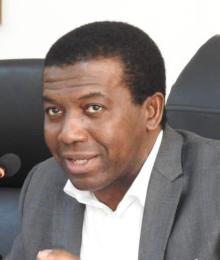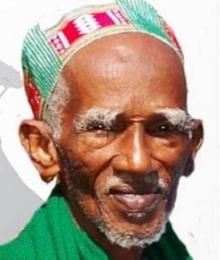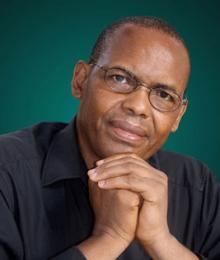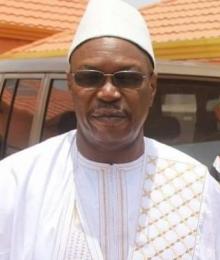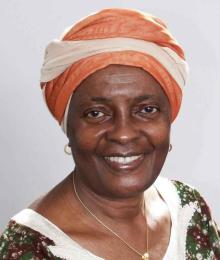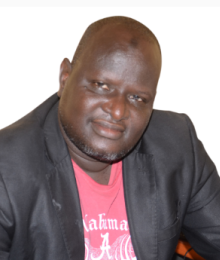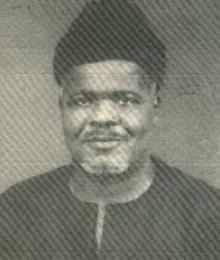
Charles Pascal Tolno (February 12, 1943 - July 2, 2017) was a prominent Guinean intellectual, writer, and politician. Originally from Tamadou in the prefecture of Guéckédou, he built his career through solid academic training, obtaining master's degrees in physical sciences and mathematics before holding key positions such as Director of the National School of Administration, Governor of Conakry (1991-1992), and Minister of Higher Education (1992-1994).
Founder and president of the People's Party of Guinea (PPG), he established himself as an essential figure in the Guinean opposition, while developing a significant literary body of work with 14 published books on political and historical themes. First president of the Pan-African Writers Association in 1989, Charles Pascal Tolno was recognized for his commitment to democracy and national unity, leaving behind at his death the legacy of a man of conviction who contributed for more than half a century to the administrative and democratic construction of Guinea.
Introduction
Charles Pascal Tolno, an emblematic figure in Guinea's political and intellectual scene, marked his era through his commitment to democracy and his contribution to African literature. Born on February 12, 1943, in Tamadou in the prefecture of Guéckédou, Guinea, he passed away on July 2, 2017, in Limoges, France, leaving behind a rich legacy in both politics and literature.
Education and Academic Background
Coming from the forest region of Guinea, Charles Pascal Tolno followed a remarkable educational path. After his primary studies in Nongoa, he continued his secondary education in several institutions across the country, notably in Kankan, Macenta, and Kindia, before obtaining his baccalaureate at the Donka High School in Conakry.
His academic excellence led him to the Polytechnic Institute of Conakry, where he earned a double master's degree in physical sciences and mathematics. Not content with these achievements, he complemented his education with independent studies in economics and political science, thus shaping a versatile intellectual profile that would serve him throughout his career.
Administrative and Political Career
Charles Pascal Tolno's professional journey demonstrates his dedication to Guinea's public service. After returning to Conakry in 1974, he took over the direction of the National School of Administration, training future administrative executives of the country.
His expertise and skills were quickly recognized, allowing him to hold high-responsibility positions:
- Regional Director of Education in Faranah and Kankan
- Dean of the Faculty of Administrative and Legal Sciences at Donka
- Governor of the city of Conakry (1991-1992)
- Minister of Higher Education and Scientific Research (1992-1994)
These ministerial functions, exercised under General Lansana Conté's regime, testify to the trust placed in his abilities, despite the political differences that would later emerge.
Political Engagement
After leaving the government in 1994, Charles Pascal Tolno fully dedicated himself to political life by founding the People's Party of Guinea (PPG), which he would chair until his death. His political vision was characterized by a deep attachment to democratic values and Guinean national unity.
A candidate in the presidential elections of 1998 and the legislative elections of 2002, he did not manage to gain power but established himself as an essential figure in the Guinean opposition. His commitment to democracy placed him at the forefront of political struggles, alongside figures like Cellou Dalein Diallo.
Under Alpha Condé's presidency, with whom he had shared years of struggle for democracy, he joined the opposition ranks, actively participating in demonstrations for respect of the electoral calendar. His political courage even led to his arrest and mistreatment by law enforcement in April 2013, alongside Aboubacar Sylla, then spokesperson for the opposition.
Prolific and Engaged Writer
Alongside his political career, Charles Pascal Tolno developed a considerable literary body of work, with no fewer than 14 books published between 1984 and 2014. His writings reflect his political, historical, and societal concerns:
- L'épée trahie (1984)
- L'Afrique et l'Asie dans les première et seconde guerres mondiales (1984)
- L'apartheid, des origines à nos jours (1987)
- L'avenir de la Guinée entre les mains des Guinéens (1990)
- L'université, une tribune (1993)
- Colonialisme et sous-développement en Afrique (1994)
- La culture et la vie (1994)
- De Gaulle et la communauté franco-Africaine (1994)
- Vers l'Union Africaine (1995)
- Sékou Touré et l'Afrique (1995)
- Le contrat de la démocratie (1998)
- Combattre pour le présent et l'avenir (2009)
- Le rendez-vous de la violence (2014)
- Transition militaire et élections présidentielles de 2010 en Guinée, l'indépendance piégée (2010)
His contribution to African literature is recognized well beyond Guinean borders. In 1989, he was elected the first president of the Pan-African Writers Association in Accra (Ghana), after founding the Guinea Writers Association (AEG). These responsibilities demonstrate his influence in the African literary world.
Man of Conviction and Unity
According to his close collaborators, particularly Dr. Fodé Oussou Fofana, vice-president of the UFDG, Charles Pascal Tolno was a man of conviction, balanced, who "never raised his voice." A close advisor to Cellou Dalein Diallo, he advocated for national unity and "believed in a reconciled Guinea where ethnicity would not be discussed. A Guinea where all the country's children are treated equally."
Despite his advanced age and fragile health, he remained at the forefront of opposition demonstrations, showing remarkable physical commitment and inspiring younger generations of activists.
Legacy
Charles Pascal Tolno's death, which occurred on July 2, 2017, at the age of 74 at the University Hospital of Limoges in France, plunged Guinea into mourning. The Republican Opposition paid tribute to "the memory of a great political man with strong convictions who actively and singularly contributed to the administrative and democratic construction of our society for more than half a century."
His remains were repatriated to Guinea and displayed in the Congress Hall of the People's Palace, before his burial on July 10, 2017, at the Kameroun cemetery in Conakry, in the presence of many political figures including Cellou Dalein Diallo.
Married and father of five children, Charles Pascal Tolno left behind not only a biological family but also a political and intellectual family that continues his fight for a democratic and united Guinea. His literary work continues to "whisper, through the ages, words of eternal wisdom to the conscience of Guinean and African youth," as the Republican Opposition so aptly expressed in their tribute.
Charles Pascal Tolno will thus remain in Guinea's collective memory as a committed intellectual, a prolific writer, and an upright politician, whose exceptional journey continues to inspire new generations.











